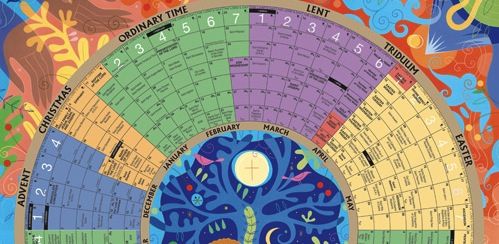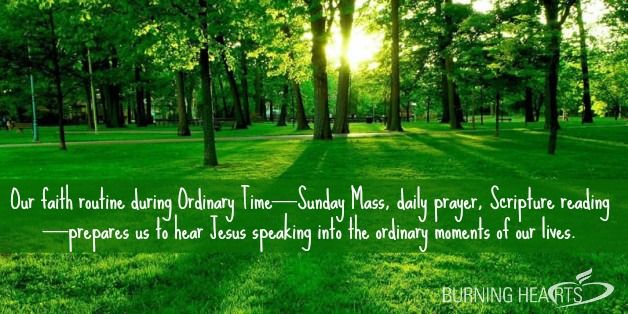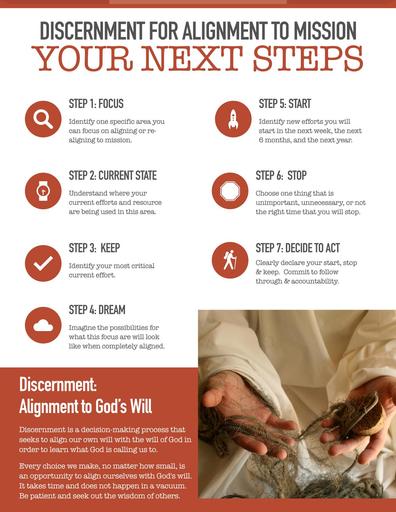Green is the color of most of our Church year. Green vestments on the priest and deacon, green banners hanging behind the altar, green plants adorning the sanctuary. After the glitz and glamor of the Christmas and Easter seasons, this season in our Church year can seem, well, ordinary.
Ordinary Time
The period in our Church year that follows the Christmas season, and then again follows the Easter season, has an unfortunate name—Ordinary Time. The name comes from the fact that while we are outside of special seasons, the Church simply counts the time as it passes (3rd Sunday in Ordinary Time, 4th Sunday in Ordinary Time, etc). It's counted time using the ordinal numbers (1st, 2nd, 3rd...) which is how it got it's name. Of course, being that it's also outside of the special seasons, it often feels mundane, routine, ordinary as well.

Rev. Larry Rice, CSP explains Ordinary Time this way...
One of the characteristics of Catholicism—indeed, of any liturgically oriented Church—is that the pattern of our worship follows a cycle of feasts and seasons. And so too, to some extent, does the secular world. Of course, those seasons don't always align. When the rest of the world is in Christmas, we're still in Advent. When we're in the Christmas season, the rest of the world has packed away the Christmas decorations and is off to the January white sales.
Our seasons run like this: Advent, which starts right after Thanksgiving; Christmas, which begins on Christmas Eve; a brief period of Ordinary Time, followed by Lent, Triduum, the Easter Season; and then a long stretch of Ordinary Time.
What precisely is Ordinary Time? We usually define it by what it's not. It's the season when there's no other season going on. If seasons were flavors, Ordinary Time would be vanilla. Of course, as any good cook will tell you, vanilla has its own often underrated flavor with its own nuances and characteristics.
To my way of thinking, Ordinary Time is the most challenging season. During Advent, there's a lot to do to prepare for Christmas. During Christmas, it's simply expected that people will be full of good cheer, promoting charity and peace on earth. Lent has its own set of internal to-do's: the prayer, fasting, almsgiving, and repentance that prepare us for the celebration of Easter. And, of course, the Triduum and Easter are the high-points of the entire year with lots of preparation and celebration. In all these seasons, parishes have programs, prayers, and activities to guide us through them.
The thing is, most of our life is ordinary time. Most of our life is not holidays and special occasions. Most of our life is mundane and average and routine—waking up, eating breakfast, work/school, dinner, repeat. Most of our life is ordinary time.

Fr. Rice goes on to say...
Ordinary Time, generally speaking, leaves us to our own routines, and our own discipline. It's the time when we have to work to integrate our spirituality with the everyday: work, school, vacation, the ebb and flow of our lives. Fortunately, we have help and assistance with that task of integration. We have something that provides the support and spiritual nourishment we need to get through the everyday routine of life. That support is called Sunday.
Sundays, especially during this vanilla season, should be part of the rhythm of life that keeps our spirituality rooted in real life. If your life feels a little out of synch, driven by external events rather than by your own priorities, maybe you should reexamine how you're keeping the Sabbath—something to think about during the nearly five months before next Advent.
It is in the quiet moments—the ordinary moments—where Jesus speaks to us. Our faith routine during ordinary time—Sunday Mass, daily prayer, Scripture reading—prepares us to hear Jesus speaking into the ordinary moments of our lives.
Despite what we think of when we hear the phrase, "Ordinary Time," this season is not merely ordinary. It’s a long celebration of the wonders that God works every day, and the challenges of following Christ with our lives. There’s nothing “ordinary” about that.
Fr. Rice is Vocations Director for the Paulist Fathers.Fr. Rice is Vocations Director for the Paulist Fathers. His article, written for the USCCB, is reprinted with permission.

